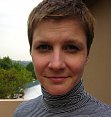Anne Fleckstein

Ph.D. Student (Scholarship holder 10/2012 - 03/2014)
Supervisors: Prof. Dr. Richard Rottenburg (MLU), Prof. Dr. Friedrich Balke (U Bochum), Prof. Dr. Armin Höland (MLU)
Mentor: PD Dr. Ralph Buchenhorst
Member of the LOST-Group
Overview
"establishing as complete a picture as possible“
Media and technologies of truth in the South African Truth and Reconciliation Commission
From 1996 to 2002, the Truth and Reconciliation Commission South Africa (TRC) launched a public national process of coming to terms with the past which was to mark the end of the apartheid regime and the beginning of a new democratic South Africa. The Ph.D. project examines which procedures, technologies and media, contribute to the constitution, authorization and transmission of historical knowledge in the TRC. It seeks, thus, to trace the conditions of media and cultural technologies of political transitions. Fundamental to this perspective is the understanding of the Commission as a "dispositif" (apparatus) which constitutes what is negotiated to be the "truth" within the TRC. This Foucault-inspired approach seeks to emphasize the TRC's high permeability for various cultural practices and technologies and, concurrently, the ephemeral establishment of institutionality.
Based on the analysis of TRC documents, videos and interviews, the project acts on the distinction of two domains: the visible and the invisible space, i.e. procedures which took place in the public visible domain and internal procedures "behind the scenes". The media and technologies of truth to be analysed comprehend administrative procedures, juridical practices, technical data processing and cultural technologies, which form the conditions for the "truth-speaking" in the hearing halls, the establishment of "cases" and "acts" behind the scenes, the various transmissions of stories up to the final report of the TRC, and the actions of the persons involved. These conditions also include technologies like e.g. enumerating, witnessing, selecting, deleting, translating, interrogating, advocating or adjudicating, as well as material dispositifs (microphone, data-base, questionnaires et al.).
The common perception of the South African truth commission as having been a singular historical turning point, which was particularly promoted through the public hearings, is to be complemented by the significance of administrative, technical and jurdical procedures for the constitution of a "new" historiography during a political transition, which places the Commission in an assemblage of historical continuities.The political relevance of the present thesis must be seen in the evaluation of the South African TRC as an experimental and, at the same time, paradigmatic form of dealing with political transitions which, nevertheless, emerged from a very specific cultural and local context. The implementation and practice of certain media and technologies which transmit, translate and transform narratives into historical facts are of vital importance for the very existence and functioning of an ephemeral institutional body like the TRC. In order to understand how such political instruments establish epistemological orders and put into practice specific ideas of justice and national reconciliation, one has to look at its practical and technical conditions of functioning.
Academics
| since 10/2012 | Doctoral student at the Graduate School "Society and Culture in Motion" | Max Planck Research School on Retaliation, Mediation and Punishment (REMEP) Martin Luther Universität Halle (Saale) - Max Planck Institute for Social Anthropology, Halle (Saale) |
| 2008-2012 | Doctoral student at the DFG Graduate Research Training Group "History of Media - Media of History" Bauhaus Universität Weimar - Universität Erfurt - Friedrich Schiller Universität Jena |
| 2007-2008 | Research associate at the BMBF Research Group „Theater und Fest in Europa. Zur Inszenierung von Identität und Gemeinschaft“ Freie Universität Berlin Sub-section 4 „Theaterkultur zwischen bürgerlicher Gesellschaft und Moderne (ca. 1850-1930): Festlichkeit – Hierarchie – Politisierung im Wandel“ (Direction: Prof. Dr. Paul Nolte) |
| 2006 | M.A. Cultural Studies & New German Literature | Humboldt-Universität zu Berlin |
| 1999-2000 | Licence IUP - Métiers des Arts et de la Culture | Université Lumière, Lyon | DAAD |
| 1995-1996 | Cours de Civilisation Française | Université La Sorbonne, Paris |
Awards
Humboldt-Preis 2006 für ausgezeichnete wissenschaftliche Arbeiten der Humboldt-Universität zu Berlin for Master thesis (Cultural Studies): „Performing truth. Performative Aspekte der öffentlichen Anhörungen der Wahrheitskommission in Südafrika“ (Supervisor: Prof. Dr. Hartmut Böhme)
Professional Experience
| 2007-2008 | Research associate | Freie Universität Berlin |
| 2005-2007 | Project assistant | Bureau du Théâtre et de la Danse, French Embassy in Berlin |
| 2004-2009 | Freelance collaborator | Visitors Programme Goethe-Institut Berlin & Ministry of Foreign Affairs |
| 2002-2003 | Project manager Cultural Programme | Goethe-Institut Berlin, Kulturbüro |
| 2001-2005 | Seminar assistant | Goethe-Institut Berlin & Goethe-Institut, Section 416 |
| 2001-2002 | Opera dramaturge (freelance) | Junges Ensemble Berlin |
| 2000-2002 | Student assistant at the Goethe-Institut Berlin |
Languages
| German | mother tongue |
| English | proficient |
| French | proficient |
| Afrikaans | good knowledge |
Publications
Articles
„Leben ausgraben. Exhumierungen als Momente der Wiederbelebung im Post-Apartheid-Südafrika“, in: Ulrike Hanstein, Anika Höppner, Jana Mangold (ed.), Re-Animationen, Berlin : Böhlau, 2012.
„,So help me God’. Bezeugen in der südafrikanischen Wahrheitskommission“, in: Sybille Krämer, Sibylle Schmidt, Ramon Voges (ed.), Politik der Zeugenschaft. Zur Kritik einer Wissenspraxis, Bielefeld : transcript, 2010.
„,An archive against memory’. Die südafrikanische Wahrheitskommission als Archiv“, in: Zeitgeschichte-online Themenschwerpunkt 2010 „Afrika“, June 2010, URL: http://www.zeitgeschichte-online.de/Themen-Fleckstein-06-2010.
Translations (from French)
Christophe Charle: „Ein paradoxes Genre. Die revues d’actualité in Paris (1852-1912)“, in: Erika Fischer-Lichte, Matthias Warstat u.a. (ed.), Staging Festivity. Theater und Fest in Europa, Tübingen, Basel : Francke, 2009 (Series Theatralität, Vol. 10).





